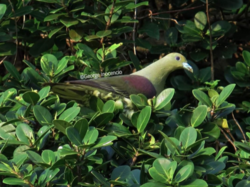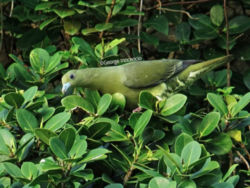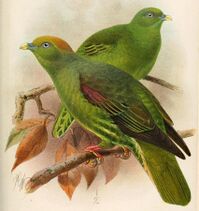Biology:Taiwan green pigeon
| Taiwan green pigeon | |
|---|---|

| |
| Male | |

| |
| Female | |
| Scientific classification | |
| Domain: | Eukaryota |
| Kingdom: | Animalia |
| Phylum: | Chordata |
| Class: | Aves |
| Order: | Columbiformes |
| Family: | Columbidae |
| Genus: | Treron |
| Species: | T. formosae
|
| Binomial name | |
| Treron formosae R. Swinhoe, 1863
| |
| Synonyms | |
| |
The Taiwan green pigeon or whistling green pigeon (Treron formosae) is a bird in the family Columbidae. The species was first described by Robert Swinhoe in 1863. It is found in Taiwan and Batanes in the Philippines .
Its natural habitats are subtropical or tropical moist lowland forests and rural gardens. It is threatened by habitat loss.
Taxonomy
The Ryukyu green pigeon (T. permagnus) of the Ryukyu Islands was formerly considered conspecific, with both species being united together as the whistling green pigeon, but was split as a distinct species by the IOC in 2021.[2][3]
There are thought to be two subspecies:[3]
- T. f. formosae - endemic to Taiwan
- T. f. filipinus - endemic to the Philippines , found on Batanes and the Babuyan Islands
Description
The Taiwan green pigeon is visually similar to the Wedge-tailed green pigeon,[4] but with usually darker plumage. Females are of various green shades throughout, and males have a distinctive purple-grey patch over the wings.
EBird describes the bird as "A variable green-pigeon of subtropical and tropical lowland broadleaf evergreen forests. Ryukyu subspecies readily approachable, sometimes found in parks and gardens; Taiwan subspecies more timid. Ryukyu and Taiwan subspecies sometimes considered separate species, as Taiwan birds are much smaller and have a rufous cap. Similar to White-bellied Green-Pigeon, but feathers around the legs never white, face less yellowish, and white edges of undertail coverts narrower. Song a low, whistling poo-aa-poooo, rising and trilling at end, recalling a bamboo flute."[5]
Habitat and conservation status
It inhabits subtropical broadleaved evergreen forest, cultivated fields where there are trees nearby, mainly lowlands and hills on small islands but is mainly a montane species on Taiwan, where it occurs up to 2,000 metres (6,600 ft).[1]
IUCN has assessed this bird as near threatened. This species' main threat is habitat loss and hunting.
References
- ↑ 1.0 1.1 BirdLife International (2016). "Treron formosae". IUCN Red List of Threatened Species 2016: e.T22727539A94952116. doi:10.2305/IUCN.UK.2016-3.RLTS.T22727539A94952116.en. https://www.iucnredlist.org/species/22727539/94952116. Retrieved 12 November 2021.
- ↑ "Species Updates – IOC World Bird List" (in en-US). https://www.worldbirdnames.org/new/updates/species-updates/.
- ↑ 3.0 3.1 (in en) IOC World Bird List 11.2 (Report). doi:10.14344/ioc.ml.11.2. http://www.worldbirdnames.org/ioc-lists/crossref.
- ↑ Goodwin, Derek (1983). Pigeons and Doves of the world. Ithaca, New York: Cornell University Press. pp. 266. ISBN 0-565-00847-1.
- ↑ "Whistling Green Pigeon". https://ebird.org/species/whgpig1/.
Wikidata ☰ Q691005 entry
 |



